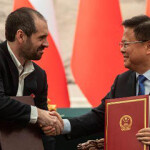Politics, economics driving Sino-Saudi seafood trade

Geopolitical and global economic shifts are driving trade between Saudi Arabia and China, while simultaneously helping the former country achieve its ambitions of dramatically increasing its aquaculture output by 2030.
Chinese aquaculture and feed firm Guangdong Evergreen Group inked a memorandum of understanding with the Saudi firm Falcon Vision this past spring, and in June 2023, Zhanjiang Guolian Aquatic Products and Saudi sovereign Public Investment Fund (PIF) signed a USD 560 million (EUR 535 million) deal, which entails the Chinese company receiving various credit lines for business in Saudi Arabia.
Saudi Arabia’s goal of achieving self-sufficiency in its seafood supply – the country’s ambitious Vision 2030, among many other goals, outlines how Saudi Arabia aims to produce 600,000 metric tons (MT) of seafood domestically by 2030 – requires foreign direct investment but also scale, said Gorjan Nikolik, the head of aquaculture research at Rabobank.
“China can assist in achieving both,” Nikolik told SeafoodSource.
That’s a view echoed by Kevin Fitzsimmons, an aquaculture expert and professor of environmental science at the University of Arizona.
“With only one aquaculture venture in Saudi Arabia, smaller operations will need partnerships with bigger international companies in order to gain the technology and operational experience they will need to compete successfully,” Fitzsimmons said.
Fitzimmons said Chinese companies are a good fit to supply Saudi Arabia with labor and technology, as several are “vertically integrated – from manufacturing feed mill equipment and making liners and netting through [to] broodstock, hatcheries, farms, and processing plants.”
From the Chinese point of view, signing deals with Saudi Arabia helps diversify the country’s sources of food supply, according to Oliver D. Nikolovski, the general director of China-based seafood sourcing and trading company Ocean Treasure, which trades shrimp in and out of China.
“Guolian already buys from India, Iran, Mexico, and Venezuela,” he said. “Buying more [seafood] from Saudi Arabia would make sense.”
Ensuring multiple lines of food supply may be even more important for China following its recent imposition of a ban on all Japanese seafood after the release of treated cooling water from the damaged Fukushima Daiichi nuclear plant.
Additionally, partnering with deep-pocketed Saudi Arabia may help …
Photo courtesy of Falcon Vision




Share